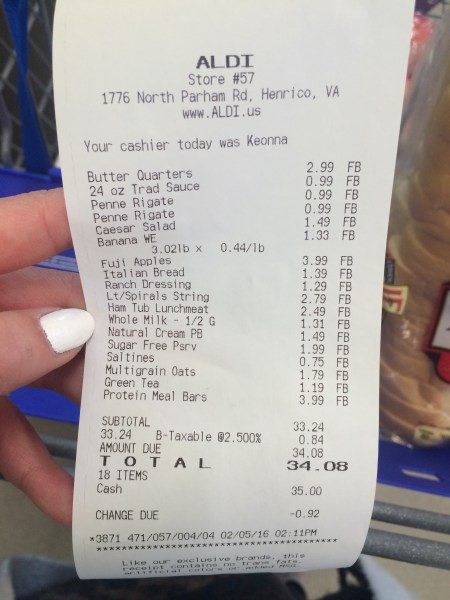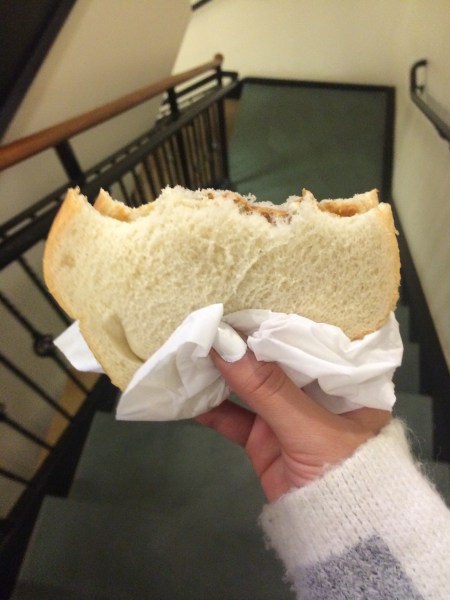 The SNAP Challenge is a weeklong experiment to get a glimpse of what life can be like for low-income Americans living on food stamps. The average daily food stamp benefit is only $4 per person per day. I took on this challenge for a “Justice and Civil Society” course in college to better understand the difficulties and unfairness of our nation’s lack of food security. My limit for a week’s worth of meals was only $30.08. By the end my meals felt almost routine: the same cereal for breakfast, peanut butter and banana sandwiches for lunch, bland pasta for dinner, apples and bananas for snacks. But handling the circumstances for a week does not mean I would be able to continue following this schedule for the rest of my life.
The SNAP Challenge is a weeklong experiment to get a glimpse of what life can be like for low-income Americans living on food stamps. The average daily food stamp benefit is only $4 per person per day. I took on this challenge for a “Justice and Civil Society” course in college to better understand the difficulties and unfairness of our nation’s lack of food security. My limit for a week’s worth of meals was only $30.08. By the end my meals felt almost routine: the same cereal for breakfast, peanut butter and banana sandwiches for lunch, bland pasta for dinner, apples and bananas for snacks. But handling the circumstances for a week does not mean I would be able to continue following this schedule for the rest of my life.
I went into this challenge with a confident and positive attitude, but I came out of it defeated and unsettled. Even with extensive research on inexpensive foods and how to maintain a healthy diet on food stamps, I did not expect to be so unprepared for the emotional, mental, and physical obstacles. My body instantly felt the effects of malnutrition as I could barely pay atten tion in class and had a hard time focusing on my work. I was grumpy, anti-social, and took naps constantly because I felt weak. Although this week-long experience was only a simulation, it still allowed me to increase my understanding and empathy for low-income families living on food stamps. And besides understanding the difficulties of not having adequate resources, I learned how privileged I am. I am so grateful for my access to healthy food, which previously I viewed as a seemingly minuscule privilege. We take for granted what we have, but a week of enduring the SNAP Challenge has given me the opportunity to put things into perspective and understand how lucky I am.
tion in class and had a hard time focusing on my work. I was grumpy, anti-social, and took naps constantly because I felt weak. Although this week-long experience was only a simulation, it still allowed me to increase my understanding and empathy for low-income families living on food stamps. And besides understanding the difficulties of not having adequate resources, I learned how privileged I am. I am so grateful for my access to healthy food, which previously I viewed as a seemingly minuscule privilege. We take for granted what we have, but a week of enduring the SNAP Challenge has given me the opportunity to put things into perspective and understand how lucky I am.
Others cannot say the same about their access to nutritious food. Rural villages in Wayanad, India struggle with economic security, which harms the ability to maintain a balanced diet. Farmers are forced to sell their harvests and even still, the profits do not suffice. They struggle to provide enough food for their families. This affects the quality of life for the men, women, and children. They lose energy, ca nnot focus, and are hindered in their daily activities. A lack of healthy foods at a young age is especially detrimental to a child’s growth and development. We at Profugo want to alleviate the stress of obtaining healthy food by instilling successful farming programs, such as our Kitchen Garden Project, in these villages. Our annual campaign this year focuses on sustainable agriculture that can continue to provide access to food for these families. I strongly urge you to consider donating, as no one should have to suffer from a lack of food security.
nnot focus, and are hindered in their daily activities. A lack of healthy foods at a young age is especially detrimental to a child’s growth and development. We at Profugo want to alleviate the stress of obtaining healthy food by instilling successful farming programs, such as our Kitchen Garden Project, in these villages. Our annual campaign this year focuses on sustainable agriculture that can continue to provide access to food for these families. I strongly urge you to consider donating, as no one should have to suffer from a lack of food security.
Learn more about the SNAP Challenge.
Please consider donating to our annual fundraising campaign!

Leave a Reply
You must be logged in to post a comment.